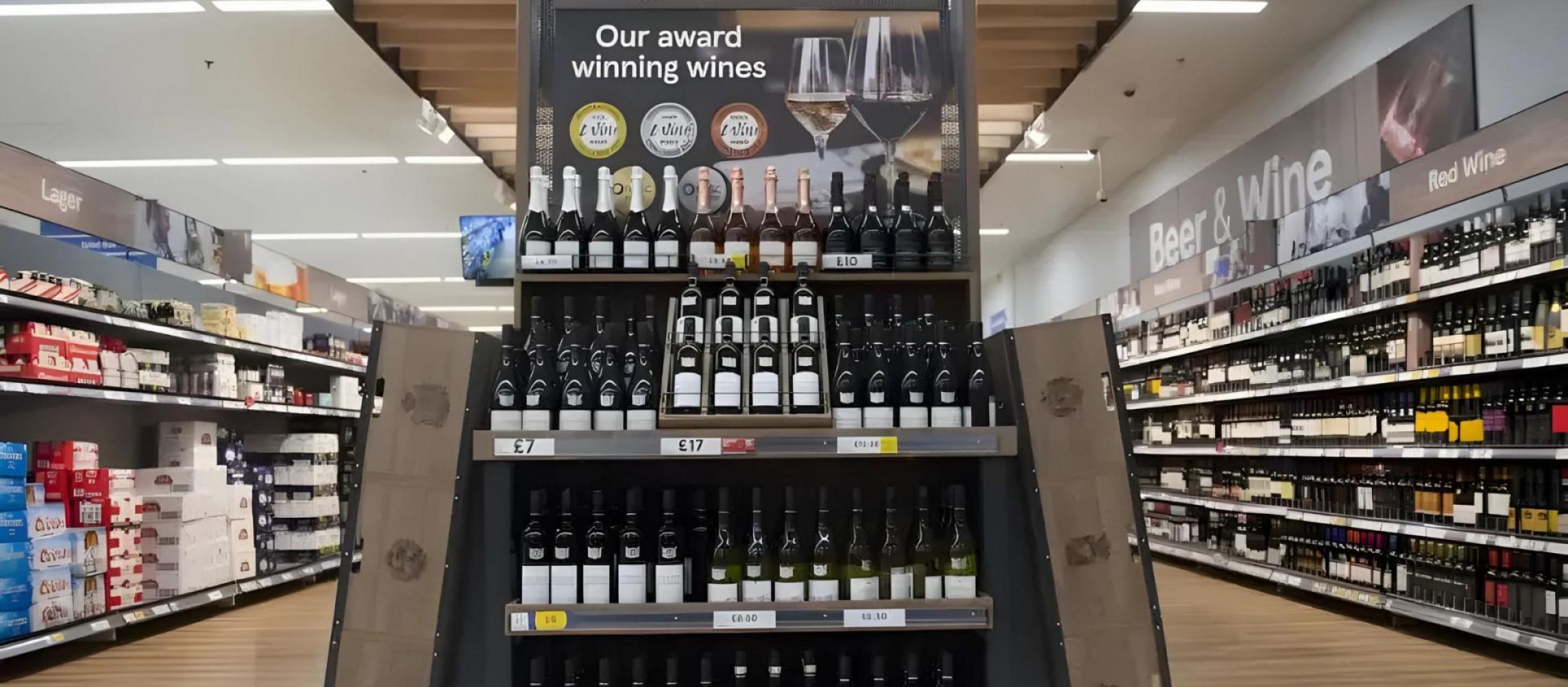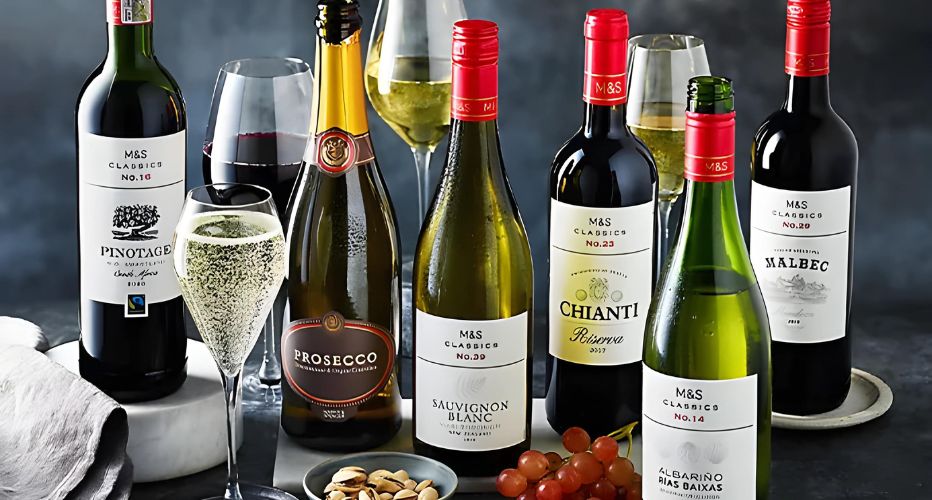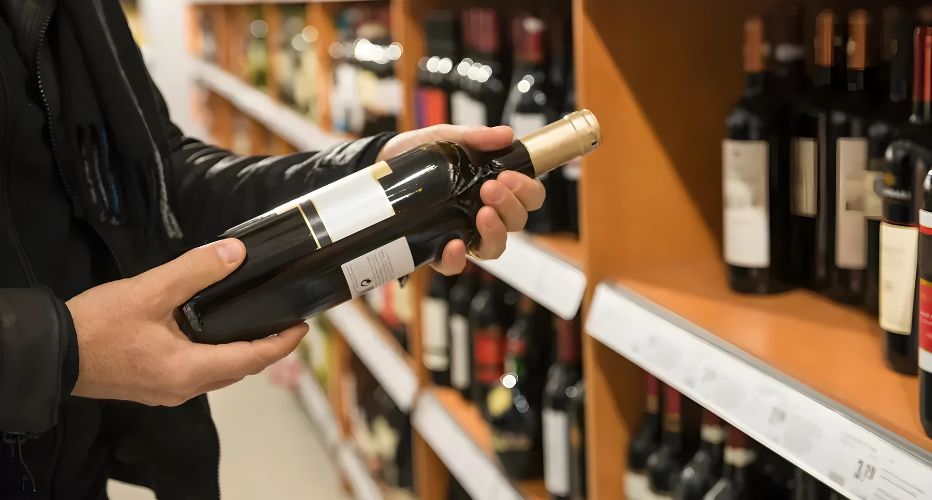Registration Open
1 June 2025
Judging
Date
23 & 24 March 2026
Winners Announcement
22 April 2026
1 June 2025
23 & 24 March 2026
22 April 2026

UK supermarkets play a pivotal role in the wine industry, shaping consumer habits and influencing global wine trends. Their reach, purchasing power, and strategic positioning make them essential players in the market. For wine producers and importers, understanding the dynamics of UK supermarkets is crucial for navigating this competitive landscape.
The significance of supermarket wine sales in the UK lies in their ability to offer convenience, variety, and accessibility to consumers. Current trends show a move towards more adventurous and quality-conscious wine drinking, with a growing interest in sustainable and organic options. However, navigating the wine aisles requires knowledge and discernment, as highlighted by expert advice, which forms a very important component of wine marketing in the UK.
From the producer's and importer’s perspective, the relationship with supermarkets is complex and often unbalanced. While supermarkets play a vital role in getting wines into consumers' hands, their profit-driven motives do not always align with the aspirations of wine producers. Understanding this dynamic is crucial for wine producers and importers who must find ways to build and maintain the value of their brands in a challenging market environment.
Jancis Robinson MW recently observed: “There was a time, towards the end of the last century, when the wine departments of Sainsbury’s, Tesco et al strained every sinew to have the best range, and to use wine as a lure to get customers into the store. But this century, with the exception of Waitrose and Marks & Spencer, whose wine buyers seem to have tried harder than others, much of the wine on offer on British supermarket shelves has been relatively lackluster, dominated by the need to shave pennies off the selling price – not helped by successive, stealthy increases in duty.”

Marks & Spencer private label wines: source: M&S
Indeed, UK supermarkets have long been significant in the wine trade. Chains like Tesco, Sainsbury’s, and Waitrose command substantial market share, offering a vast array of wines to millions of consumers. Their extensive distribution networks ensure that wines from around the world are accessible to a broad audience. This accessibility is a double-edged sword; while it provides exposure for lesser-known wines, it also demands that producers and importers meet rigorous standards and competitive pricing.
Supermarkets influence consumer preferences through their selections. They often feature wines that cater to the prevailing tastes and trends, thereby guiding purchasing behavior. For instance, the popularity of Prosecco and rosé wines can be attributed in part to their prominent placement and promotion in UK supermarket chains. This trend-setting ability underscores the importance of securing a place on supermarket shelves.
Quality and Consistency: Supermarkets require consistent quality to maintain consumer trust. Producers must ensure that each bottle meets the retailer's standards, as inconsistency can lead to delisting and loss of market share.
Competitive Pricing: Price is a critical factor in the supermarket wine sector. Producers and importers must navigate the fine line between maintaining profitability and offering attractive prices to both the retailer and the end consumer. This often involves economies of scale and efficient production and distribution practices. Producers must accept that building and maintaining the value of their brand falls on them, not the retailers. Effective marketing is essential but challenging due to thin profit margins. Supermarkets often expect producers to fund discounts, perpetuating a cycle that makes brand-building more difficult.
Volume Capability: Supermarkets often require large volumes of wine to meet their wide distribution needs. Small producers may struggle to meet these demands, making partnerships with importers or larger wine companies essential.
Brand Recognition and Marketing: Supermarkets favor wines with strong brand recognition or those that come with effective marketing support. Wine producers must invest in branding and marketing efforts to stand out on crowded shelves. This can include featuring awards from wine competitions as well as critics’ scores and reviews.
Sustainability and Certifications: Increasingly, consumers and retailers are prioritizing sustainable practices. Certifications such as organic, biodynamic, or fair trade can be advantageous, appealing to the growing demographic of environmentally-conscious consumers.
Deciding whether to include UK supermarkets in a winery's marketing and sales strategy involves weighing several pros and cons.
The advantages include:
- Wide Reach: Supermarkets provide unparalleled access to a broad consumer base. This exposure can significantly boost brand recognition and sales volumes.
- Consumer Trust: Many consumers trust supermarkets to curate quality selections, which can lend credibility to wines stocked on their shelves.
- Market Data: Supermarkets collect extensive consumer data, which can be invaluable for producers seeking to understand market trends and preferences.
- Convenience for Consumers: The convenience of purchasing wine alongside groceries can drive impulse buys and regular purchases, fostering brand loyalty.
Possible disadvantages of working with UK supermarkets include:
- Price Pressures: The competitive nature of supermarket pricing can squeeze profit margins, particularly for smaller producers who may not benefit from economies of scale.
- High Volume Requirements: Meeting the volume demands of large chains can be challenging for boutique wineries, potentially leading to quality compromises or supply issues.
- Brand Dilution: Being stocked in supermarkets can sometimes dilute a brand’s exclusivity, particularly for premium or niche wines.
- Dependence on Retailers: Relying heavily on supermarkets can make producers vulnerable to changes in retailer policies or shifts in consumer trends.
Jancis Robinson observed: “Such is Tesco’s dominance in the UK that the company sells one in every four bottles of wine retailed here, Sainsbury’s one in six. In a way, the thing these large supermarkets are best at is sourcing their cheaper wines that are bought in such large volumes that they can persuade their suppliers to pare margins down to a minimum. Once you go higher up their ranges, prices are rarely dramatically lower than some independent retailers can offer and can be higher.”

Image Source: CNET
New Zealand's Villa Maria provides a compelling case of how a winery can successfully integrate supermarkets into its strategy. By ensuring consistent quality and capitalizing on the growing popularity of Sauvignon Blanc, Villa Maria has secured a strong presence in UK supermarkets. Their strategic approach includes robust marketing campaigns and maintaining a balance between supermarket sales and other distribution channels, thus preserving brand prestige.
La Rioja Alta offers another perspective, opting to maintain its premium positioning by being selective regarding supermarkets. By focusing on specialized wine shops and direct-to-consumer sales, La Rioja Alta preserves its brand's exclusivity and can command higher prices. This approach underscores the importance of aligning distribution strategies with brand positioning.
Multi-Channel Approach: A balanced strategy that includes supermarkets, specialty retailers, and direct-to-consumer channels can mitigate risks associated with over-reliance on one outlet. This approach also allows wineries to target different consumer segments effectively.
Value Proposition: Clearly defining and communicating a wine’s unique value proposition is crucial. Whether it’s heritage, terroir, sustainability, or innovation, this differentiation can help wineries stand out in a crowded market. This can be enhanced by winning awards at international wine competitions or receiving high scores from critics, and then effectively communicating these accolades as part of an integrated strategy.
Partnerships and Collaborations: Collaborating with importers or larger wine companies can help smaller producers meet volume requirements and navigate the complex logistics of supermarket distribution. Strategic partnerships can also provide marketing support and amplify brand reach.
Adaptability and Innovation: The wine industry is dynamic, with consumer preferences and market conditions constantly evolving. Wineries must remain adaptable, continually innovating their offerings and marketing strategies to stay relevant.
Sustainability Initiatives: Embracing sustainable practices not only appeals to environmentally-conscious consumers but also aligns with many supermarkets' corporate social responsibility goals. This alignment can enhance a winery’s attractiveness to retailers.
In the final analysis, UK supermarkets are undeniably influential in the global wine industry, offering significant opportunities for exposure and sales. However, the decision to engage with this sector must be carefully considered, taking into account factors such as quality consistency, pricing, volume capabilities, and brand positioning. For many wineries, a strategic, multi-channel approach that includes but is not solely dependent on supermarkets can provide the best of both worlds: broad reach and maintain brand integrity. By understanding the complexities and demands of the supermarket sector, wine producers and importers can make informed decisions that align with their long-term goals and market positioning.
Header Image Source: JancisRobinson.com
The 2026 International London Wine Competition submission is now open. You can enter your wines now to get the super early bird pricing.